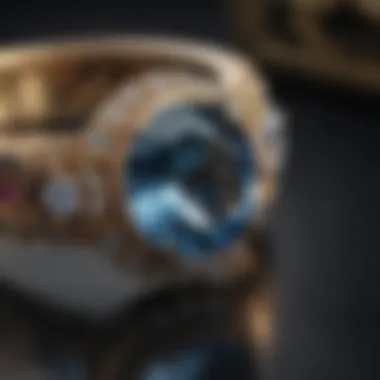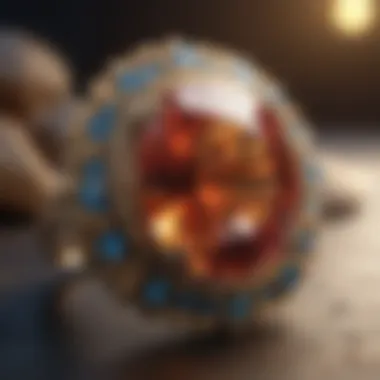Discover the Best Places to Get Your Jewelry Valued for Accuracy


Overview of Gemstones and Minerals
Gemstones and minerals hold a profound significance in various cultures and societies around the world. From ancient civilizations to modern gemstone enthusiasts, these precious stones have captivated human attention for centuries. The history of gemstones and minerals dates back to antiquity, where they were revered for their supposed mystical properties and aesthetic appeal.
In many cultures, gemstones have been used not only for adornment but also for religious purposes, believed to bring luck, protection, and healing. The significance of gemstones in society extends beyond mere material value, influencing art, fashion, and even economic systems. Whether it's the mysterious allure of the diamond or the serene beauty of emeralds, gemstones continue to hold a special place in our hearts and minds.
Gemstone Formation and Properties
Intriguing in their creation, gemstones undergo a fascinating formation process deep within the Earth's crust. Over millions of years, minerals and heat combine to create these remarkable stones, each with its distinctive properties and characteristics. Gemstones are defined by their inherent qualities, such as color, hardness, luster, and clarity, which determine their value and appeal.
The classification of gemstones is based on a myriad of factors, including their chemical composition, crystal structure, and optical properties. From the vibrant hues of rubies and sapphires to the iridescent glow of opals, each gemstone showcases a unique blend of colors and patterns that add to its allure and market desirability.
Types of Gemstones
Gemstones are typically categorized as precious or semi-precious based on their rarity, beauty, and durability. Precious gemstones like diamonds, rubies, sapphires, and emeralds command high prices and are treasured for their exceptional qualities. In contrast, semi-precious gemstones such as amethyst, citrine, turquoise, and garnet offer a wide range of colors and affordability.
Within these categories, there exists a vast array of common gemstone varieties that cater to diverse tastes and preferences. From the classic elegance of pearls to the fiery allure of topaz, each gemstone type has its own unique charm and appeal. For those seeking something truly extraordinary, exotic and rare gemstones like alexandrite, taaffeite, and musgravite present a world of exquisite beauty and exclusivity.
Identifying and Evaluating Gemstones
Various factors influence the value and quality of gemstones, making their evaluation a nuanced process that requires expertise and precision. Gemstone identification involves meticulous examination of characteristics such as color, clarity, cut, and carat weight to determine authenticity and market worth.
Gemologists employ a range of techniques, including microscopic inspection, spectroscopy, and fluorescence tests, to assess the quality and authenticity of gemstones. These professionals rely on their knowledge of gemological principles and industry standards to provide accurate evaluations and certifications.
Caring for Gemstones
Proper care and maintenance are essential to preserve the beauty and longevity of gemstones. Cleaning gemstones regularly with mild soap and a soft brush helps remove dirt and oils that can dull their appearance. Storing gemstones in a cool, dry place away from sunlight and harsh chemicals prevents damage and discoloration over time.
Avoiding common mistakes like exposing gemstones to high heat, extreme temperatures, or abrasive surfaces is crucial to maintaining their brilliance and luster. Different gem types require specific preservation strategies, such as avoiding prolonged exposure to water for porous gems like opal or preventing chemical contact for sensitive stones like emerald.
By following these care instructions and investing in regular maintenance, gemstone enthusiasts can ensure that their precious pieces retain their beauty and value for generations to come.
Introduction
In the vast world of gemstones and jewelry, understanding the value of your jewelry is paramount. Whether you are a passionate collector, an enthusiast, or a skilled jewelry designer, knowing the worth of your treasured pieces holds significant importance. This article delves deep into the avenues available for valuing your jewelry, providing invaluable insights for individuals seeking to ascertain the value of their gemstone collections.


Understanding the Value of Your Jewelry
Factors Influencing Jewelry Value
When it comes to determining the value of jewelry, various factors come into play. From the quality of gemstones to the intricacy of the craftsmanship, each element contributes to the overall value of a piece. Factors like gemstone rarity, clarity, cut, and color heavily influence the appraisal value. Understanding these critical aspects is crucial for accurately valuing your jewelry, ensuring that you receive a fair assessment based on the specific characteristics of your pieces.
Importance of Professional Valuation
Professional jewelry valuation services offer expertise and precision in assessing the worth of your valuable pieces. Bringing in a professional appraiser ensures that your jewelry is thoroughly evaluated using industry standards and methodologies. The meticulous approach of professional valuers guarantees a comprehensive assessment, taking into account all relevant factors that contribute to the overall value of your jewelry. While professional valuations may incur a cost, the benefits of having a precise and detailed appraisal far outweigh the expenses, especially when dealing with high-value or sentimental pieces.
Importance of Jewelry Valuation
Insurance Purposes
One of the key reasons for valuing your jewelry is for insurance purposes. Accurately assessing the value of your pieces ensures that you have adequate insurance coverage in case of loss, damage, or theft. Insurance companies often require detailed valuations to determine the replacement cost of your jewelry, making professional appraisals essential for safeguarding your precious gemstones. By obtaining regular valuations, you can continue to update your insurance coverage to reflect the current market value of your jewelry.
Resale Value Considerations
Apart from insurance considerations, understanding the resale value of your jewelry is crucial for those looking to potentially sell or trade their pieces in the future. Factors like market trends, demand for certain gemstones, and historical significance can all impact the resale value of jewelry. By assessing the resale value of your pieces, you can make informed decisions regarding selling or investing in new pieces, maximizing the returns on your collections.
Traditional Valuation Methods
In this section of the article, we delve into the crucial topic of Traditional Valuation Methods. Understanding the significance of this subject is paramount for individuals keen on evaluating the worth of their jewelry pieces. Traditional methods offer a robust framework that encompasses in-depth assessment techniques, ensuring a comprehensive valuation process. By exploring Traditional Valuation Methods, readers can gain insight into the historical practices and methodologies that form the foundation of modern valuation approaches, providing a well-rounded understanding of the valuation landscape.
Fine Jewelry Appraisal Services
Local Jewelry Stores
Diving into the realm of Local Jewelry Stores, we uncover a pivotal aspect of the valuation process. These establishments play a significant role in offering appraisal services to individuals seeking to assess the value of their jewelry items. The key characteristic of Local Jewelry Stores lies in their accessibility and personalized service. By leveraging the expertise of local store professionals, individuals can obtain tailored valuation insights that cater to their specific requirements. The unique feature of Local Jewelry Stores is their proximity, enabling face-to-face interactions that foster trust and transparency in the valuation process. While local stores provide convenience and personalized attention, it's essential to consider potential limitations such as restricted access to specialized gemological equipment.
Independent Appraisers
Independent Appraisers contribute a distinct perspective to the valuation domain, showcasing expertise in providing unbiased and professional assessments. The hallmark of Independent Appraisers is their impartiality and autonomy, guaranteeing objective evaluations of jewelry pieces. Opting for independent professionals offers a fresh outlook on the value of jewelry items, ensuring an unbiased appraisal process. The unique feature of Independent Appraisers lies in their flexibility and independence from commercial affiliations, instilling confidence in the valuation results. While independent appraisers offer an objective assessment, it's important to note that relying solely on individual opinions may lack the collective insights available through other valuation avenues.
Auction Houses and Antique Dealers


Specialized Expertise
Auction Houses and Antique Dealers bring specialized expertise to the forefront, bringing a wealth of knowledge and experience to the valuation process. The key characteristic of these entities is their deep understanding of market trends, historical significance, and intrinsic value of jewelry pieces. By engaging with Auction Houses and Antique Dealers, individuals can tap into a reservoir of expertise that enriches the valuation experience. The unique feature of Specialized Expertise lies in the comprehensive assessments provided by seasoned professionals, offering a holistic view of the jewelry's worth. While specialized expertise assures detailed valuation insights, it's essential to consider potential costs associated with high-end auction houses.
Market Insights
Exploring Market Insights offered by Auction Houses and Antique Dealers, individuals gain access to valuable information regarding market fluctuations, collector preferences, and industry trends. The key characteristic of Market Insights is the wealth of data and analysis available, empowering individuals to make informed decisions regarding their jewelry pieces. By leveraging market insights, individuals can align their valuation expectations with current market dynamics, enhancing the accuracy of appraisal outcomes. The unique feature of Market Insights is the strategic advantage it provides in navigating the competitive jewelry marketplace, enabling individuals to maximize the value of their cherished pieces. While market insights offer a wealth of information, it's essential to interpret the data judiciously and consider the ever-evolving nature of the jewelry market.
Modern Valuation Approaches
In this article, a detailed examination of Modern Valuation Approaches is undertaken to shed light on contemporary methods of valuing jewelry. As the jewelry industry evolves, embracing technological advancements, understanding these modern approaches becomes indispensable. Modern Valuation Approaches offer a fresh perspective on assessing the worth of precious pieces, providing a blend of convenience and accuracy that aligns with the demands of today's consumers. Through exploring Modern Valuation Approaches, individuals can gain insights into innovative valuation techniques that cater to a digital age.
Online Valuation Platforms
Accuracy and Limitations
A pivotal aspect of Online Valuation Platforms, Accuracy and Limitations play a crucial role in determining the reliability of digital valuation tools. These platforms boast the advantage of delivering quick and convenient assessments of jewelry value, leveraging algorithms and databases to generate estimations. However, it is essential to acknowledge the limitations of such systems, where factors like the inability to physically inspect the jewelry may impact the accuracy of the valuation. Despite these drawbacks, Online Valuation Platforms present a popular choice for individuals seeking instant valuations without the need for in-person appraisals.
Popular Websites
Within the realm of Online Valuation Platforms, Popular Websites offer a user-friendly interface and an extensive reach, making them a preferred option for consumers navigating the digital valuation landscape. These websites often feature straightforward valuation processes, allowing users to input information about their jewelry and receive prompt estimates. Though convenient and accessible, Popular Websites may lack the personalized touch of a traditional appraisal, potentially affecting the depth of the valuation analysis. Understanding the advantages and disadvantages of Popular Websites is imperative for individuals looking to leverage digital platforms for valuing their jewelry effectively.
Mobile Applications for Valuation
Convenience and Reliability
Mobile Applications for Valuation introduce unmatched convenience and reliability into the process of assessing jewelry worth. By bringing valuation tools directly to users' fingertips, these applications streamline the valuation experience, offering on-the-go solutions for determining the value of jewelry. The reliability of such applications lies in their ability to provide quick evaluations, catering to individuals seeking immediate insights into their jewelry's value. While the convenience of Mobile Applications for Valuation is undeniable, users should be mindful of potential limitations related to accuracy and comprehensive analysis.
User Experience
A significant element of Mobile Applications for Valuation, User Experience encompasses the usability and functionality of these digital tools. The user-centric design of these applications enhances the valuation process, making it intuitive and accessible for individuals of varying technical proficiencies. Engaging interfaces and simplified steps contribute to a positive user experience, ensuring that users can navigate the valuation process smoothly. However, it's essential to consider how User Experience influences the depth of the valuation provided, as prioritizing ease of use may come at the expense of detailed assessment. By evaluating the unique features of User Experience, individuals can make informed decisions when utilizing Mobile Applications for Valuation.
DIY Valuation Techniques
When it comes to establishing the worth of one's jewelry, exploring DIY Valuation Techniques is an integral aspect of this article. Highlighting the key points of DIY Valuation Techniques sheds light on the self-assessment tools available to gemstone aficionados, collectors, and jewelry artisans. By considering specific elements such as gemological tools and resources, individuals can delve into the intrinsic value of their precious pieces independently. The benefits of opting for DIY Valuation Techniques include a deeper connection with one's jewelry collection, a greater understanding of gemstone quality, and an opportunity to empower oneself in the valuation process. However, it is crucial to acknowledge that DIY valuation comes with certain considerations, such as the need for a basic understanding of gemology and access to reliable valuation tools.


Gemological Tools and Resources
Loupe and Scale
Discussing the Loupe and Scale within the realm of gemological tools and resources is paramount to the overall objective of accurately valuing jewelry. The Loupe, a magnification device, paired with a Scale for measuring weight, plays a vital role in scrutinizing gemstone characteristics. The key characteristic of the Loupe and Scale is their precision in examining gemstone clarity, inclusions, and size, enabling individuals to assess the quality and value of their jewelry with meticulous detail. The Loupe's unique feature lies in its ability to reveal intricate details that are unseen by the naked eye, giving users an advantage in identifying gemstone authenticity and craftsmanship. While the Loupe and Scale are beneficial choices for DIY valuation, it is essential to note that their effectiveness relies on the user's proficiency in gemstone evaluation.
Refractometer and Spectroscope
Delving into the significance of the Refractometer and Spectroscope contributes to the overarching goal of comprehensive jewelry valuation. These instruments are key in determining a gemstone's refractive index, optical properties, and identifying certain gem species. The Refractometer and Spectroscope's key characteristic lies in their ability to provide objective measurements that aid in gemstone identification and quality assessment. Their unique feature includes detecting gemstone treatments and synthetic materials, offering valuable insights into the authenticity and integrity of jewelry pieces. While utilizing the Refractometer and Spectroscope is advantageous in DIY valuation, users should be aware of the technical proficiency required for accurate readings and interpretation.
Testing for Precious Metals
Acid Testing
Exploring the method of Acid Testing in evaluating precious metals is crucial for understanding the composition and value of jewelry. This testing process involves applying acid directly to the metal to determine its purity, with different acid reactions indicating varying metal content. The key characteristic of Acid Testing is its effectiveness in distinguishing between different metal types and assessing their karat purity accurately. Its unique feature lies in providing a quick and cost-effective way to verify the metal composition of jewelry pieces, offering insights into their material value. While Acid Testing is a popular choice for DIY valuation, individuals should exercise caution and follow safety guidelines when handling corrosive materials to avoid any accidents.
Magnet Test
Examining the significance of the Magnet Test in jewelry valuation sheds light on identifying ferrous and non-ferrous metals. This test involves using a magnet to determine if a metal is attracted (ferrous) or not (non-ferrous), aiding in distinguishing between precious and base metals. The key characteristic of the Magnet Test is its simplicity and accessibility, making it a useful tool for preliminary metal assessment. Its unique feature includes providing a quick method to sort metals based on magnetic properties, allowing individuals to differentiate between valuable and non-valuable metals easily. While the Magnet Test is a popular choice for DIY valuation, it is essential to note that this method may not be foolproof, as some non-ferrous metals can exhibit weak magnetic properties, requiring further verification through alternative testing methods.
Conclusion
Valuing jewelry is a critical step for gemstone enthusiasts, collectors, and jewelry designers. Without understanding the worth of precious pieces, individuals may overlook potential financial gains or may not adequately protect their investments. The process of jewelry valuation involves various methods, each catering to different needs and circumstances. By choosing the right valuation method, individuals can ensure accurate assessments and informed decision-making regarding their jewelry.
Choosing the Right Valuation Method
Considering Your Needs
Considering your needs is a crucial aspect when selecting a valuation method for your jewelry. Understanding why you need the appraisal, whether for insurance coverage, resale purposes, or personal satisfaction, helps in determining the most appropriate approach. This consideration ensures that the valuation method aligns with your specific requirements, maximizing the benefits derived from the assessment. By tailoring the valuation to suit your needs, you can optimize the value of your jewelry while meeting your objectives effectively.
Seeking Expert Advice
Seeking expert advice is paramount in ensuring the accuracy and reliability of the valuation process. Experts possess in-depth knowledge of gemstones, precious metals, and market trends, enabling them to provide an informed assessment of your jewelry's value. Consulting with professionals reduces the risk of undervaluation or overvaluation, offering a realistic and precise estimation. While expert advice may incur additional costs, the benefits of receiving a comprehensive and professional appraisal far outweigh the expenses, especially in maximizing returns and making well-informed decisions.
Continuous Evaluation of Jewelry
Regular Updates
Regularly updating the valuation of your jewelry is essential for staying informed about its current market value. Market trends, the rarity of gemstones, and demand for certain designs can impact the worth of your jewelry over time. By obtaining regular updates on valuation, you can track fluctuations in value and make strategic decisions regarding your collection. This proactive approach ensures that you are well-informed about the financial aspect of your jewelry investments, allowing you to leverage opportunities or make adjustments based on the market dynamics.
Reappraisal Schedules
Establishing reappraisal schedules is a prudent practice to maintain the accuracy of your jewelry's valuation. As market conditions evolve and the value of gemstones fluctuates, periodic reappraisals help in reflecting these changes in your jewelry's assessed worth. By adhering to reappraisal schedules, you can avoid outdated valuations, prevent potential financial losses, and adapt your insurance coverage or resale strategies accordingly. Maintaining up-to-date valuations through regular reappraisals safeguards your jewelry investments and ensures that they are appropriately valued in changing market environments.







